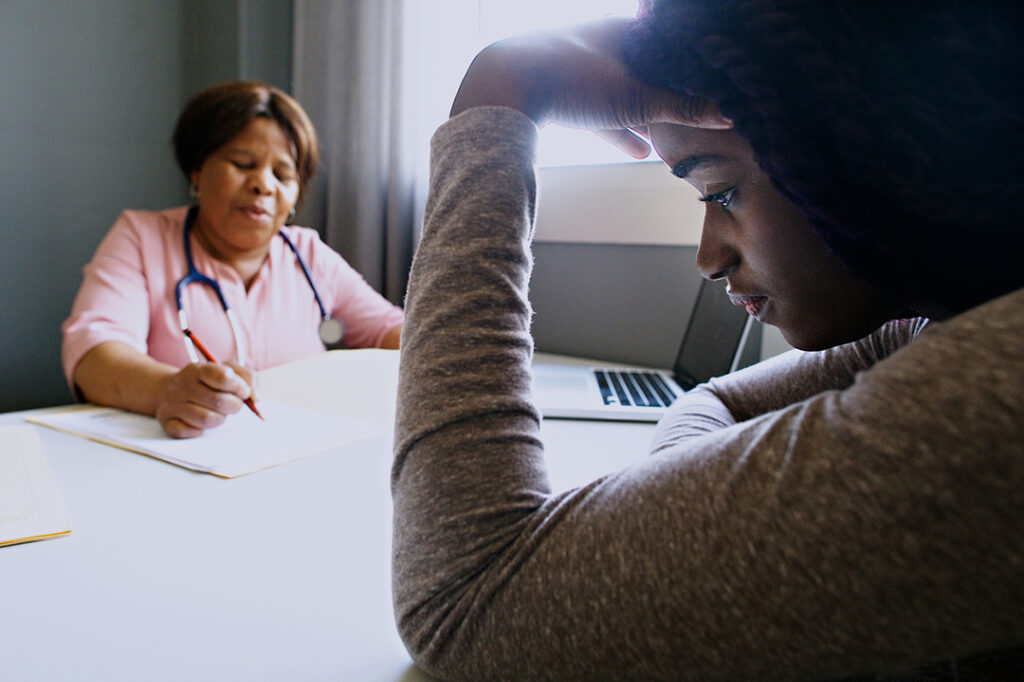ADF STAFF
The COVID-19 pandemic has affected people in ways that are clear and hard to define. Among the more subtle effects are the fear and anxiety felt by people over how the virus will change and how best to protect themselves and loved ones. That fear has evolved into deeper mental health issues that still must be addressed for some people, according to a team led by researcher Keneilwe Molebatsi of the University of Botswana.
“Extreme states of anxiety, stresses, social stigma, and discrimination are associated with COVID-19, hence there is need of enhancing mental and psychosocial well-being of people affected,” Molebatsi wrote in a paper published by Frontiers in Psychiatry. “The mental health crisis which results from the multi-level impact of the pandemic has, however, gone on unattended.”
Molebatsi’s research is among several studies examining the toll the COVID-19 pandemic has taken on the mental health of millions of Africans over the past two years. Researchers say the impact should prompt important changes in Africa’s health care after the pandemic has passed.
“There will be some long-lasting effects on the psyche and the mental state of the population, based on what has happened before,” Dr. Kagisho Maarooganye, a board member of the South African Society of Psychiatrists, told VOA News.
Africans are no strangers to epidemics, whether caused by Ebola, yellow fever, chikungunya other viruses. That familiarity led nations to respond swiftly with lockdowns and border closures when the pandemic first arrived on the continent. However, the tactics taken to slow the spread of COVID-19, including nationwide lockdowns, made mental health problems worse because they isolated people, shuttered businesses and ramped up fear of the disease.
Health care workers on the front lines of the pandemic were especially hard-hit by mental health problems as they worried about their own safety while treating COVID-19 patients, according to Marianne Mureithi, a senior researcher at the University of Nairobi in Kenya.
“In Kenya, there was a lot of panic, hysteria and a lot of misinformation about what the virus was,” Mureithi told CNBC Africa. “It led to some mental health challenges, mental breakdown and burnout. It’s still an ongoing challenge.”
Beyond health care, the stress connected to lockdowns led to an increase in domestic violence against women and widespread feelings of anger and hopelessness, experts said.
A broad review of mental health surveys conducted across Africa found that 49% of health care workers reported experiencing pandemic-related mental health issues compared to 38% of the general population. That suggests that governments need to focus more mental health resources on helping front-line health workers cope with the stresses of the pandemic, according to the team of international researchers.
Unlike other parts of the world, Africans reported higher rates of depression than any other mental health issue related to the pandemic. Within Africa, mental health issues were greater in North African countries than in Sub-Saharan countries, the team reported.
Complicating matters, the emergency response to COVID-19 tended to leave mental health care on the fringes even as Africans’ levels of anxiety, depression and insomnia rose. The public health response was a reminder that mental health remains drastically underfunded in most countries, Maarooganye said.
“Now we’re in the pandemic, and you’re finding yourself on the back foot with an already fragile system and not knowing how to go about fixing it,” Maarooganye said. South Africa, home to one of the continent’s best health care systems, dedicated just 5% of its funds to mental health care, he added.
A survey by the World Health Organization’s (WHO’s) Africa regional office in 2020 found that, among the 28 countries responding, all included some aspect of mental health care in their COVID-19 response plans. Despite that, mental health issues are a lingering issue as the pandemic enters its third year, experts say.
“Overall, the pattern of mental health issues has been on the rise since COVID-19,” Dr. Daniel Letsoalo, a South African clinical psychologist, told CNBC Africa.
The WHO recommends that countries allot more of their health care funding to mental health to help their citizens recover from the stresses caused by the pandemic. The pandemic hasn’t ended and neither have the mental health issues that came with it, South African clinical psychologist Sathasivian Cooper told SABC News.
“Studies show there’s a pervasive feeling of almost hopelessness … lots of anger,” Cooper said. “People are very, very uncertain. We need to learn better coping strategies.”

